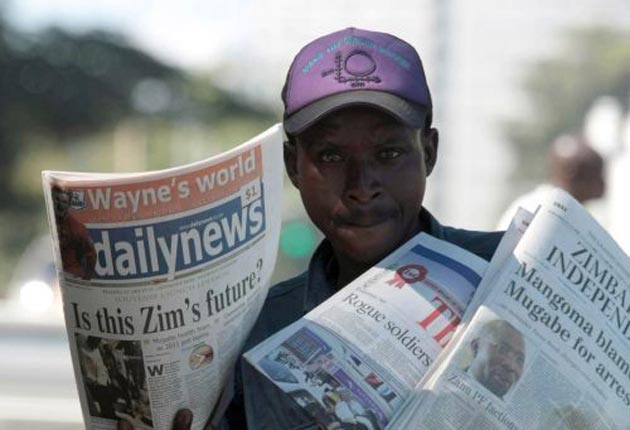Newspaper banned by Mugabe is back on sale

Your support helps us to tell the story
From reproductive rights to climate change to Big Tech, The Independent is on the ground when the story is developing. Whether it's investigating the financials of Elon Musk's pro-Trump PAC or producing our latest documentary, 'The A Word', which shines a light on the American women fighting for reproductive rights, we know how important it is to parse out the facts from the messaging.
At such a critical moment in US history, we need reporters on the ground. Your donation allows us to keep sending journalists to speak to both sides of the story.
The Independent is trusted by Americans across the entire political spectrum. And unlike many other quality news outlets, we choose not to lock Americans out of our reporting and analysis with paywalls. We believe quality journalism should be available to everyone, paid for by those who can afford it.
Your support makes all the difference.The once-banned Daily News, known for its criticism of President Robert Mugabe, returned to the streets of Zimbabwe yesterday, appearing for the first time in nearly eight years with a promise to highlight bad governance.
It comes as Zimbabwe's fragile unity government teeters on the edge of total collapse. The Prime Minister and former opposition leader, Morgan Tsvangirai, spoke of leaving Mr Mugabe's coalition last week after a minister with his Movement for Democratic Change (MDC) was arrested on what the party said were trumped-up charges.
A number of other party activists have since been detained and there are reports that Mr Mugabe is planning to have his Prime Minister arrested for contempt of court after Mr Tsvangirai accused the ruling party of using judges to harass its critics.
Mr Mugabe, 87, denies that he is poised to call a snap election but harassment of political opponents has increased markedly since the beginning of the year. Abolishing restrictions on the media, including the return of what was once the country's most popular daily were among the key demands made prior to the MDC's agreement to share power with Mr Mugabe.
The closure of the Daily News in 2003 – after seeing its printing press blown up and its journalists routinely harassed – marked a low point in the Mugabe regime's campaign against the independent media. The state-owned Herald newspaper, meanwhile, was reduced to a mouthpiece for the regime and principally read by Zimbabweans for clues as to who was up or down in the ruling party's internal squabbles.
Major news organisations like the BBC were expelled from the country and international journalists were threatened with jail terms if they were caught without official accreditation, which the government frequently refused to grant.
The Daily News is the second privately owned paper to open since the unity government was formed.
"We unapologetically declare that we will take a critical stand against bad governance and expose it for the entire nation to see," the paper said in an editorial yesterday.
Join our commenting forum
Join thought-provoking conversations, follow other Independent readers and see their replies
Comments